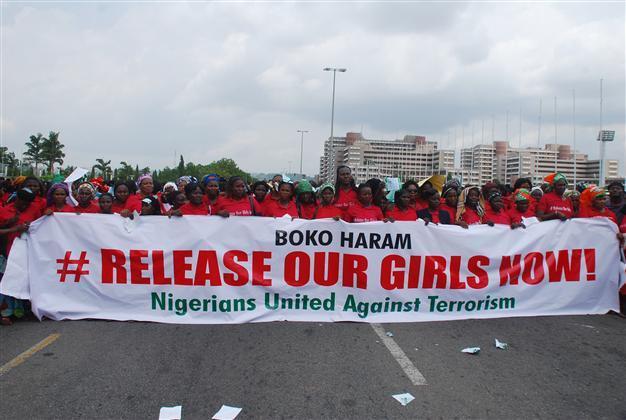'We know where missing girls are': Nigeria's top brass
ABUJA - Agence France-Presse

In this Monday, May 26, 2014, photo, the Nigerians United Against Terrorism group attends a demonstration calling on the government to rescue the kidnapped girls of the government secondary school in Chibok, in Abuja, Nigeria. AP Photo
Nigeria's highest ranking military officer on Monday gave a glimmer of hope to the families of more than 200 schoolgirls held by Boko Haram militants, revealing they had located the missing teenagers.
But Chief of Defence Staff, Air Chief Marshal Alex Badeh, warned that any potential armed rescue operation was fraught with danger as the 223 girls still held hostage could be caught in the crossfire.
Boko Haram fighters kidnapped 276 girls from the remote northeastern town of Chibok on April 14, leading to global outrage.
"The good news for the girls is that we know where they are but we cannot tell you," Badeh told reporters in the capital Abuja, as the hostage crisis entered its seventh week.
Nigeria's government and military have been sharply criticised for their slow response to the mass abduction and were finally forced to accept foreign help in the rescue effort.
US drones have been surveying northeast Nigeria and neighbouring Chad from the air while British, French and Israeli teams have been on the ground providing specialist assistance.
The military has previously said that the search was centred around the Sambisa forest area of Borno, in northeast Nigeria, where makeshift militant camps have previously been found as well as arms and ammunition caches.
Badeh earlier addressed demonstrators who had marched on Defence Headquarters in Abuja in the latest in a series of protests that have sought to maintain pressure on the government and keep the disappearance in the spotlight.
The officer refused to divulge specific details, describing the operation as a "military secret", but he added: "We are working. We will get the girls back."
Addressing the protesters, Badeh said the military was faced with a dilemma of whether to send in ground troops, given fears of deaths and casualties among the hostages.
"Nobody should come and say the Nigerian military does not know what it's doing. We know what we are doing. We can't go and kill our girls in the name of trying to get them back," he told the crowd. "So, we are working. The president (Goodluck Jonathan) is solidly behind us. The president has empowered us to do the work."
The United Nations Security Council last week designated Boko Haram an Al-Qaeda-linked organisation, in a move designed to curb any overseas funding and support, as well as restrict its leaders' movements.
But analysts have questioned whether the sanctions would have any effect on the ground, given the Islamists' largely localised campaign of murderous violence to create an Islamic state in northern Nigeria.
Others have expressed concern that the international attention has even legitimised and enhanced Boko Haram's status within the wider, global jihadi network, which could prompt more support from other extremist groups.
President Jonathan has referred to Boko Haram as "Al-Qaeda in Central and Western Africa", given long-suspected links between the group and Al-Qaeda in the Islamic Maghreb (AQIM) and Al-Qaeda in the Arabian Peninsula (AQAP).
Badeh touched on possible foreign assistance to the militants, saying that weapons recovered during operations were "very alien to Nigerian armed forces, which means there are people from outside fuelling this thing (the insurgency).
"Mr President said we have Al-Qaeda in west Africa. I believe it 100 percent because I know that people from outside Nigeria are in this war. They are fighting us.
"They want to destabilise our country and some people in this country are standing with the forces of darkness. We know. We must salvage our country. We must bring sanity back to our nation."
Suspected Boko Haram gunmen meanwhile stormed a Christian village in northeaster Adamawa state on Sunday, killing 20 residents, a local government spokesman said.
The attack in Waga by heavily armed fighters on trucks and motorcycles bore all the hallmarks of a Boko Haram attack and came after at least 24 people were killed in a similar strike on Kamuya village in neighbouring Borno.
Multiple raids in Borno last week, including two near the missing girls' hometown of Chibok, left more than 80 people dead.
The wave of attacks cement the view that the group can strike seemingly at will, encountering little or no resistance from the military.
Adamawa, Borno and Yobe states have all been under a state of emergency since May last year. Special powers were extended for a further six months last week.
